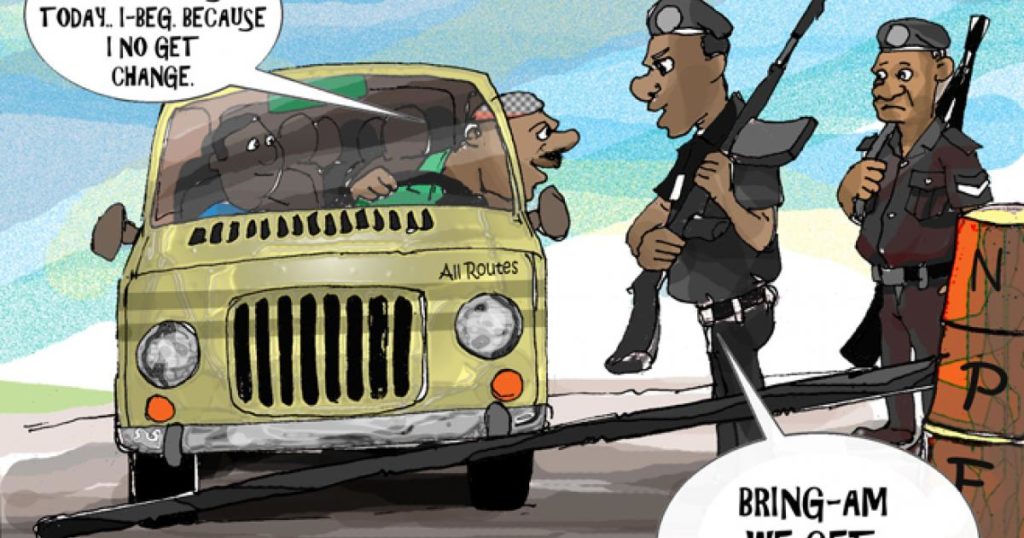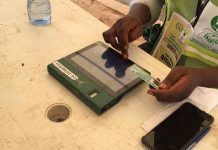
THE National Human Rights Commission, NHRC, on Friday stated that Enugu and Imo state recorded the highest form of extortion by security agencies during the lockdown to contain the spread of Coronavirus (COVID-19) pandemic.
The commission also said that the two states also recorded the highest form of human rights violations by the security agencies during the lockdown.
According to the Deputy Director, Monitoring, NHRC, Richmond Iheme, the curtailment of human rights has to be just and reasonable for the public good and to the extent necessary in a democratic society.
Mr. Iheme observed that the first phase of lockdown of two weeks recorded more human rights violations than the second phase and the one-week extension, adding that the outcry and condemnation of such infractions may have contributed to the reduction in subsequent phase.
He recalled that about 105 human rights violations were reported within two weeks of the first phase of the lockdown period monitored and documented by the commission, while the second phase of another two weeks and the next extension by one week recorded 104 human rights violations were reported across the country.
READ ALSO: Right to privacy, data protection and the COVID-19 syndrome in Nigeria
According to him, “Various factors may account for it. You will recall that after release of the first report by the National Human Rights Commission where extra judicial killings mainly were reported against law enforcement agencies besides other violations; there was so much public outcry, so much condemnation against such infractions, and unlawful killings by security agencies who ought to indeed protect lives. There was so much condemnation that trailed the release of that first report.
“Following that, expectedly the high command of the various security agencies had a responsibility to call their officers to order and they seem to have done that as was shown in their conduct during the second phase of enforcing the lockdown. .
“So, calling to order of the security agencies by their high command seems to have resulted in the seeming reduction in the violations recorded during the second phase, besides the condemnation that followed the release of the first phase of the report.”
On why Enugu and Imo were said to have recorded the highest number of violations by security agencies, Mr. Iheme attributed it to the excessive use of force in the affected areas.
He said, ” It shows the pattern of the violations that had occurred in these places and indeed in other parts of the Federation and you will see that incidents of excessive or disproportionate use of force, torture, inhuman and degrading treatment, seizure and confiscation of property, arrest and unlawful detention extortion, were high in those states
“People who flouted the ‘stay at home order’ were arrested and extorted. People were also detained and extorted before they were released. These account to the pattern of violation you find in Enugu, Imo as well as other places.”
He noted that the Police were mainly implicated in these infractions, adding that what the commission was canvassing was to ensure accountability in law enforcement.
“If accountability is ensured if people who break the law in course of enforcing the law are held to account if they are reprimanded if they are brought to book and held to justice to account for their misdeeds, to account for their misconduct or unprofessional deeds in the course of enforcement, the police on the field would see that you can’t get away with impunity anymore.
“You can’t get away with lawlessness in the course of enforcing the law anymore, they can’t get away with high handedness or excessive use of force, you can’t get away with unlawful conduct any more.
” That is indeed where we look forward to get to. We look forward to a situation where law enforcement officers that break the law in the course of enforcing the law are held to account and brought to justice. Unless this is done, impunity will thrive.
” So, to the extent that such accountability continues, the level of infractions would likely continue to reduce but if this is not done, we would go back where we were and that is an era of impunity in law enforcement and that cannot be condoned.”
Asked how the various agencies and even the government and the people could build on the improvement recorded during the last phases of the lockdown, he said,” One, the importance of compliance with human rights standards in the course of law enforcement needs not to be overemphasized.
“It is important that law enforcement officers comply with minimum human rights benchmarks in the course of law enforcement.
” You cannot break the law in the course of enforcing the law. And persons who commit violations in the course of enforcement ought to be brought to book, they ought to be held responsible for their violations.
READ ALSO: Lockdown violation: Court convicts 67, fines 33
“It would be unfortunate if infractions are swept under the carpet, If persons who commit human rights violations are not held accountable, impunity will be the order of the day. So, bringing perpetrators to account is one sure way of deterring others from committing similar infractions.
“Secondly, it is important to properly brief security operatives – debrief them before deploying them for operations. It seems to me that security operatives deployed to enforce the lockdown were not properly briefed on what to do in the course of the enforcement.
“They seem to be carrying out the enforcement as if it were a routine law enforcement without realizing the peculiar circumstance of the COVID-19 lockdown enforcement.
” So appropriate debriefing before deployment will also be helpful in curbing infractions…”
On the various types of violations report of the commission was talking about, Iheme said, “The report collated within the period of monitoring the lockdown enforcement covers a range of human rights thematic areas.
“This includes extrajudicial killings, inhuman and degrading treatment, right to dignity of the human person and freedom from torture, inhuman and degrading treatment, unlawful seizure and confiscation of property, unlawful detention, extortion, access to justice concerns among others. There were issues of domestic violence too.
“Let it be noted that the report shows documented cases of violations by the commission, it doesn’t in any way claim to be all the violations that might have occurred during that period.
“Indeed, there must have been other violations that occurred but these are the violations that were monitored and documented by the National Human Rights Commission.
“Recall particularly that when the initial report was released and 18 deaths were recorded to have occurred during that first phase, Femi Falana, a Senior Advocate of Nigeria had drawn attention that there were three other deaths that had occurred too. Some other civil society organizations would have also recorded some violations in the course of the enforcement of the lockdown. ”
The second phase report showed 11 extrajudicial killings were documented by Monitors during second period out of which the Nigerian Police were allegedly responsible for 7 deaths.






